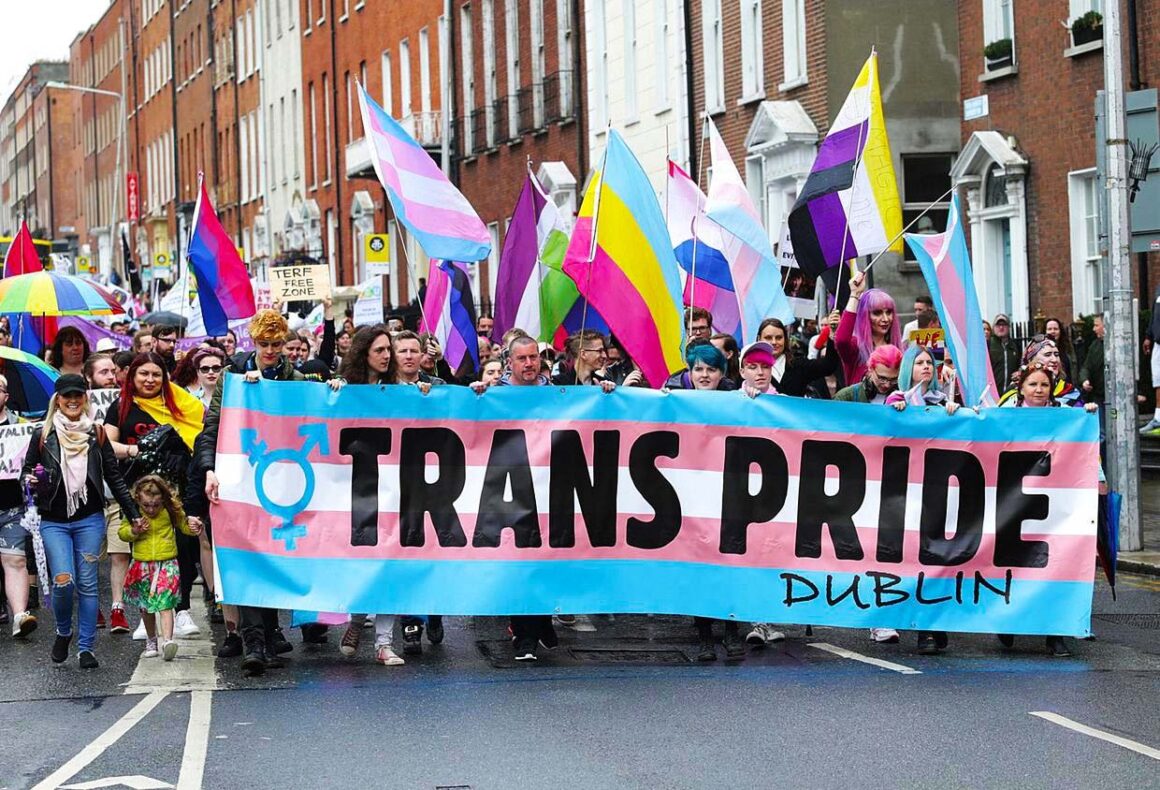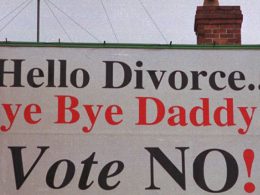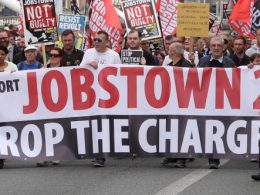There is a developing right-wing backlash against the rights of the LGBTQ community, particularly trans people, here in Ireland and globally. Conor Payne analyses this phenomena, and how homophobia and transphobia are bound up with the existence of capitalism.
In April 2022, two gay men, Aidan Moffitt and Michael Snee were murdered within 24 hours of each other in Sligo; murders seemingly motivated by homophobic hatred. Well attended vigils took place across the island to stand in solidarity with the loved ones of Aidan and Michael and to show opposition to homophobic and transphobic bigotry. These brutal killings brought home a reality – that just being LGBTQ+ can still put you at risk of potentially deadly violence.
This spate of murders was sadly not an isolated incident. In fact it takes place in the context of an apparent rise in homophobic and transphobic violence. The same week Evan Somers was brutally beaten in Dublin City Centre after being subjected to homophobic verbal abuse. In May, a lesbian couple was assaulted in Dublin. In the North, the number of homophobic and transphobic hate crimes recorded by the PSNI in 2021 was higher than it has ever been before. Three hundred and thirty six homophobic and 42 transphobic crimes were recorded in that year,(1) although clearly many such crimes will not be reported to the police. Jennifer, a trans woman in Belfast, spoke to the BBC about experiencing six years of ‘soul destroying’ attacks on her home.(2)
Britain also saw a sharp rise in hate crimes against LGBTQ+ people in 2020 and 2021. (3) In 2021, Gary Jenkins was murdered in Cardiff by three people in a homophobic hate crime. The prosecutor in his opening comments to the Jury engaged in blatant victim blaming, telling them: “His sexual proclivities were to be his undoing. By engaging in that activity he rendered himself hopelessly vulnerable and was an easy target as he wandered about Bute Park. By its nature the activity he engaged in was risky.” (4)
Worrying international trend
This rise in violence comes in a context of increasing attacks on the rights of LGBTQ+ people in many countries, in particular fueled by an emboldened reactionary right. In the US, Florida’s ‘Don’t Say Gay’ law seeks to ban LGBTQ+ inclusive education in schools. Versions of this law have now been proposed in 20 states. Fifteen states have passed bans on trans youth participating in sport. (5) In Texas, the governor has issued a directive that parents who support trans young people in transition are guilty of ‘’child abuse’’ and at least three families were placed under criminal investigation before the directive was put on hold pending adjudication in the courts. (6)
In Britain, the Tory government consciously excluded trans people from its ban on conversion therapy and is increasingly adopting transphobic rhetoric and positions amidst a growing moral panic in the media and political establishments against trans people. The Attorney General Suella Braverman openly called for schools to take a “much firmer line” against trans young people: “Schools don’t have to say, ‘OK, we’re going to let you change your pronoun or let you wear a skirt or call yourself a girl’s name.’” (7)
In Hungary, far right ruler Viktor Orban called an anti-LGBTQ referendum as part of his campaign for reelection, although the vote failed after less than the required 50% of voters cast a ballot. In China, there are growing indications of a crackdown against the LGBTQ+ community with thousands of LGBTQ+ accounts deleted from messaging app WeChat; broadcasters ordered to “resolutely put an end to sissy men and other abnormal aesthetics” appearing on TV; and one of the country’s leading LGBTQ+ organisations shut down.
It is no coincidence that the increasingly bold and aggressive rhetoric of the right has a particular focus on trans people. They recognise that a transformation has taken place in public attitudes and see that it isn’t easy to reverse measures such as marriage equality. They understand that trans people are a more oppressed and less widely understood section of LGBTQ+ people and think they gain traction by whipping up fear and hate relating to trans people in public bathrooms, participation in sport by trans people, trans children and young people etc. Undoubtedly, however, they have their sights set on the rights and status of all LGBTQ+ people.
Progress won through struggle
Ireland is not immune from these trends. Sections of Irish media have already begun to push a phoney ‘’debate’’ on trans rights giving an outsized platform to voices opposing trans rights. This was most graphically illustrated when RTE’s Liveline dedicated three programmes to giving sympathetic coverage to anti-trans campaign groups and views. Much of this coverage was completely distorted. For example, a group of campaigners which had announced in advance that they planned to disrupt a National Women’s Council of Ireland event were presented as having been excluded simply for ‘asking questions’. Under the cover of calling for a debate, sections of the media establishment are trying to create a damaging moral panic against trans people.
While the far right has not gained the levels of support electorally that it has in other European countries, it is increasingly emboldened, organised and seeking to capitalise on the discontent and alienation of many from the establishment. A particularly sinister example of this was their homophobic campaign, including public protests, targeting Minister for Children Roderic O’Gorman in 2020.
And despite the current progressive veneer of the ‘mainstream’ Irish establishment, their real record tells a different story. Trans people face waits of up to ten years to access trans healthcare, while adolescent care has ceased entirely. (8) Those who do access the National Gender Service at Loughlinstown in Dublin will be faced with a completely outdated model of care based on the pathologisation of trans people. Patients have faced very personal and intrusive questions about their sex lives and experiences of abuse. Adult patients have been required to bring a parent to assessments. (9) Schools remain dominated by the Catholic Church and there is no guarantee of access to LGBTQ+ inclusive sex education for young people. The state has just gifted the new National Maternity Hospital to a church-run organisation.
Of course, in recent years there have been major legal improvements and a huge positive change in social attitudes to LGBTQ+ people in Ireland and in many other countries. These gains were the result of decades of determined campaigning by LGBTQ+ people and others. In Ireland, this included the referendum on marriage equality where the mass involvement of LGBTQ+ people, young people and working-class people as a whole delivered a 62% Yes vote. They were not granted from above.
Most establishment politicians who now brand themselves as progressive and liberal only came to support demands like marriage equality after a sea change in social attitudes had already been affected. Barack Obama publicly opposed marriage equality until 2012, Hillary Clinton until 2015. Even Leo Varadkar told the Dáil in 2010: “Every child has the right to a mother and father and, as much as is possible, the State should vindicate that right. That is a much more important right than that of two men or women having a family.” (10)
Rights can’t be taken for granted
Nonetheless, the struggles and gains won have created a situation where much bigger sections of the establishment than before trade on their support for LGBTQ+ equality, even if this rhetoric is often not matched by their real policies. Many corporations are also falling over themselves to market themselves as LGBTQ+ friendly, now that it is safe to do so. The hollowness of this can be seen in the recent campaign to unionise Starbucks in the US; a company which stresses its inclusivity and employs many LGBTQ+ workers is now using every trick in the book to try to crush these same workers when they organise to fight for decent conditions at work.
However, these victories should not give rise to illusions in a slow and steady progress, where bigotry simply fades away over time. Whenever women, LGBTQ+ peole and people of colour have made gains, there has also come a backlash which attempts to roll back those gains. That backlash is now taking place on all fronts – the likely overturning of Roe v Wade in the US, the attacks on the Black Lives Matter movement, as well as the rise in homophobia and transphobia. “Rainbow Capitalism’’ can neither tackle the roots of inequality – because it is based on a system which has inequality in its DNA – nor provide the strategy to fight back against attacks on our rights.
The main LGBTQ+ organisations have generally adopted a limited and conservative political outlook, viewing it as their job not to pressurise establishment politicians but to lobby and build connections with them. Rather than trying to build a mass movement based on mobilisation from below, they have turned Pride in many places into an apolitical ‘celebration’. Rather than build solidarity with the struggles of other oppressed groups and of workers, which was a feature of earlier LGBTQ+ movements, they have stressed that their cause poses no threat to the established order.
This approach now needs to be challenged. It is completely inadequate to an era where a new reactionary threat is developing, and where capitalism is more and more seen to offer not progress but only increasing misery for the majority.
Women’s and LGBTQ+ oppression
Capitalism and class society are bound up with homophobia and transphobia. For most of human history, humans lived in hunter gatherer societies. While life in these societies often meant a struggle for survival, there was also no basis for systematic exploitation or inequality, including gender inequality. All labour, including the care of children, was a collective responsibility of the community.
The development of agriculture meant the accrual of a surplus of goods and created the basis for the specialisation of labour; for the first some were able to be freed up from the daily struggle to provide the group with the necessities of life. Over time this meant the development of class society, with a ruling class who expropriated the surplus wealth of society and a majority who laboured to produce it. Maintaining this new system of private property required some things which had not been necessary before – including a state to forcibly maintain the privilege of the new ruling class but also a patriarchal family based on male dominance over women. This enabled a system of inheritance to pass down land, property and privileges.
The development of the systemic oppression of women inevitably brought with it an ideology which promoted the fundamentally different natures of men and women and punished anyone who deviated from their prescribed gender roles, or whose relationships didn’t fit within the mandated family structure. In that sense, homophobia and transphobia are linked intrinsically with the oppression of women.
Obviously this ‘ideal’ family structure has changed many times, including with the development of capitalism in the modern era. In pre-capitalist societies, most economic production took place within the family structure itself; capitalism transformed this with the development of mass production and industrialisation. This did not mean the liberation of women – rather for many working-class women it meant working for wages in a factory, office or shop while continuing to do the unpaid domestic labour of cooking, cleaning, caring for children and other family members, all essential to the daily functioning of capitalist society. Under capitalism the idealised family unit became the ‘nuclear family’; one man, one woman and children, largely atomised from wider family and community.
Returning to radical roots
According to Oxfam, the value of women’s unpaid work is $10.9 trillion a year worldwide. (11) The gender pay gap and the devaluing of paid work in sectors dominated by women, such as care, also adds massively to capitalist profitability. At the same time, while the ‘traditional’ family has largely broken down in the lives of many people, it maintains an ideological importance for capitalism, which uses it to stress that care for children and the vulnerable are the responsibility of family members, that social problems can be blamed on bad parenting etc. And clearly for the right wing today, restoring the idyllic past of traditional families, traditional masculinity and femininity are key touchstones.
It’s inevitable that any such system will also entail the oppression of LGBTQ+ people whose very existence stands as a refutation of the inevitability of rigid gender roles and patriarchal family structures.
This connection between homophobia and capitalism was relatively widely understood in the earlier LGBTQ+ struggles, which emerged in particular after the Stonewall riot in 1969. These struggles developed alongside the radicalisation of the 60s and 70s, the anti-Vietnam war movement, the Civil Rights Movement, the women’s movement. LGBTQ+ people also faced at this time an unmistakably hostile system with overt police repression and media demonisation. Socialist ideas had real influence and sections of the movement sought consciously to link up with workers’ struggles. An inspiring example of this occurred in the 1984-5 Miners’ Strike in Britain where ‘Lesbians and Gays Support the Miners’ built real links with miners and their communities. The results included the participation of a contingent of miners in the London Pride parade and the backing of the NUM to change the Labour Party’s policy to support LGBTQ+ rights.
However, while the struggles of LGBTQ+ people eventually won significant changes, capitalism continued. The rise of neoliberalism, the knocking back of working-class organisation across many countries and the ideological triumphalism of capitalism after the collapse of the Stalinist states in the former Soviet Union also meant that the best radical traditions of the LGBTQ+ liberation struggle were seriously weakened. The leaders of the main LGBT organisations sought to integrate themselves with the system and make progress within its confines, not to challenge it.
The way to liberation
But we are in a new era of capitalism and this approach cannot see us through. Capitalism has brought us a world in deep crisis; economic, political and ecological. Millions around the world are again drawing anti-capitalist and socialist conclusions, especially young people. Working-class people have never recovered their living standards from the crash of 2008 and now face a new economic and cost of living crisis. This inevitably means social explosions and revolts which can shake this system. At the same time, new movements against oppression have developed; including a new feminist wave and the anti-racist uprising of 2020 in the US which also brought people onto the streets across the world.
At the other end of things, we are seeing increased repression and authoritarianism in response. We are also seeing the growth of a new populist and reactionary right which seeks to capitalise on popular discontent and channel it not against the system but against the left, against minorities, in defence of ‘traditional values’. Every reserve of prejudice and bigotry is dredged up in the service of maintaining a social system which cannot offer genuine improvements or solutions.
There are definite limits to the support that can be won for this kind of reactionary agenda – it is still the case that in Ireland for example the vast majority are supportive of LGBTQ+ people and our rights. And these politics are absolutely repellent to the majority of young people in particular. But it will only be decisively defeated if young people, oppressed people and workers are organised and mobilised to confront it.
The rise in homophobic and transphobic violence, the attacks on trans people in politics and the press, the growth of the far right – there are more than enough reasons that we need a new movement in defence of LGBTQ+ rights, on a new and different basis.
We need a movement based on some key hallmarks:
- Mass mobilisation and strikes: mass mobilisation on the streets and across society is needed to confront right-wing attacks on LGBTQ+ rights. Such mobilisations were a key element in winning repeal and marriage equality. In the US, students and teachers have walked out of schools to protest the ‘Don’t Say Gay’ bills. A starting point would be turning Pride – which now mobilises tens of thousands annually in Dublin alone – back into an occasion of real protest. This means breaking with the strategy of lobbying and building connections with the capitalist establishment and state. Mass movements can put politicians under real and effective pressure and win gains like a LGBTQ inclusive sex education system. Workers in sectors like education and healthcare are at the frontline of many new homophobic and transphobic measures and can use their power as workers to withdraw their labour in the fight against them.
- Linking with all struggles against oppression and inequality: the forces attacking LGBTQ+ rights are also attacking women’s rights, immigrants and people of colour, the environment and the working class. There can be no ‘apolitical’ or ‘single issue’ politics in this context. We can fight these attacks by linking the struggles of LGBTQ+ people with the other struggles for justice and equality in society, and seeking to build a united struggle of all those oppressed and exploited by this system.
- Opposing the rule of capitalism: ‘Rainbow capitalism’ will not deliver equality or liberation. Big corporations – which are often paying workers poverty wages and wrecking our planet for profit – should not be welcomed at Pride. We need the exact opposite approach: one that confronts this whole system of profiteering at the expense of peoples’ rights and dignity. Being anti-capitalist should be more than a rhetorical flourish. It means developing a strategy based on mobilising the power of the working class and demands which go against the whole logic of this system. Fighting for trans healthcare should also mean fighting for a fully public and secular health service, free at the point of use. It also means ending the private ownership and control of the pharmaceutical industry which profits off the medical needs of LGBTQ+ people, as well as everyone else.
- Fighting for democratic socialist change: taking the wealth, resources and industry out of the hands of big business and the super-rich and bringing it into public ownership under the democratic control of working class people would lay the basis for a whole new way of organising society. It would mean replacing a system which relies on division and inequality with one based on genuine solidarity and cooperation between people. It would not need rigid gender roles or backward prejudices to prop it up. The massive resources which are now squandered in the interest of profit could be used to ensure the liberation of all and the genuine free development of every individual. In such a world, LGBTQ liberation could become a reality.












